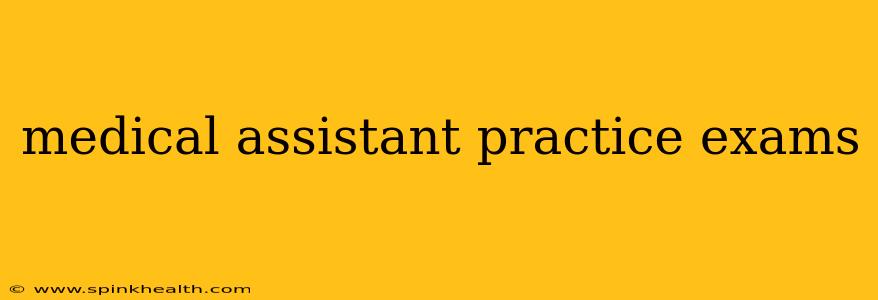Ace Your Medical Assistant Exam: A Journey Through Practice Questions and Beyond
The hum of anticipation. The flutter of nerves. The medical assistant exam looms large, a crucial stepping stone on your path to a rewarding career. But fear not, aspiring medical assistants! This isn't just about memorizing facts; it's about mastering the skills and knowledge that will allow you to thrive in a dynamic healthcare environment. This guide will take you on a journey through the world of medical assistant practice exams, addressing common concerns and helping you prepare for success.
Imagine this: You're finally holding that certification. The feeling of accomplishment, the doors now open to a career where you can make a real difference in people's lives. To reach that point, effective preparation is key. And practice exams are your secret weapon. They don't just test your knowledge; they reveal your strengths and weaknesses, guiding your study efforts where they're needed most.
What are the types of questions found in Medical Assistant practice exams?
Medical Assistant practice exams mirror the real thing, encompassing a broad range of question types designed to assess your competency across various domains. You'll encounter:
- Multiple-choice questions: These test your knowledge of medical terminology, procedures, and administrative tasks.
- True/false questions: Quick assessments of your understanding of fundamental concepts.
- Matching questions: Linking terms, definitions, or procedures to their corresponding descriptions.
- Fill-in-the-blank questions: Testing your recall and ability to apply medical knowledge in specific contexts.
- Scenario-based questions: These questions present realistic clinical scenarios, requiring you to apply your knowledge to make informed decisions – crucial for effective practice.
Preparing for these varied question types is essential for comprehensive exam readiness.
How many practice exams should I take?
There's no magic number, but consistency is key. Aim for a range of practice exams to build familiarity with the format and content. Start with one or two to gauge your baseline knowledge and identify areas needing improvement. As you progress, gradually increase the number of practice exams to solidify your understanding and build confidence. The goal isn't just to achieve a high score on each exam, but to learn from your mistakes and refine your approach.
Where can I find reliable Medical Assistant practice exams?
Numerous resources offer practice exams, but it's crucial to choose credible sources. Look for reputable organizations, established educational platforms, and review books from well-known publishers. The quality of the practice exams directly impacts the effectiveness of your preparation. A poorly constructed exam might confuse rather than clarify, potentially hindering your performance.
How can I use practice exams effectively?
Don't just take the exam and forget about it! Use each practice test as a learning opportunity. Analyze your mistakes: Why did you get the question wrong? Was it a knowledge gap, a misunderstanding of the question, or something else? This analysis will guide your further study. Focus on your areas of weakness, revisiting relevant textbooks, review materials, and seeking clarification from instructors or mentors if needed.
What should I do after I complete a practice exam?
After completing a practice exam, take some time to review your answers and analyze your results thoroughly. Identify your strengths and weaknesses. Focus on the areas where you struggled and dedicate more time to studying those topics. Remember that consistent effort and strategic learning are far more effective than simply taking a large number of practice tests without focused review.
Are there specific topics I should focus on when studying for the exam?
The specific topics covered in your medical assistant exam will depend on the certifying body. However, common areas include:
- Medical terminology: Understanding prefixes, suffixes, and root words is paramount.
- Anatomy and physiology: Basic knowledge of the human body's structure and function.
- Clinical procedures: Assisting with examinations, injections, EKGs, and other procedures.
- Phlebotomy: Drawing blood safely and accurately.
- Medical administration: Scheduling appointments, managing medical records, and handling insurance claims.
- Legal and ethical considerations: Understanding HIPAA, patient confidentiality, and professional boundaries.
Thorough preparation across these areas will build a strong foundation for exam success.
Embarking on this journey to become a certified medical assistant is a testament to your dedication and commitment. Remember, success is built not just on knowledge but also on persistence and a strategic approach. Use practice exams wisely, learn from your mistakes, and celebrate your progress along the way. Your future as a compassionate and skilled medical assistant awaits!

